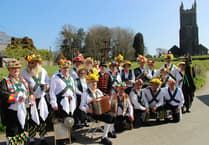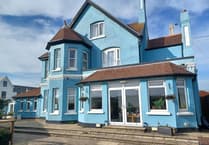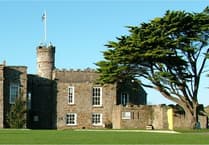A working group was formed following the Shaping My Community event held in February, with an initial focus on economic development, education and training. After a few meetings the group decided that starting a local transition movement would be a great way to support or develop projects that re-localise Bude’s economy while providing opportunities for young people to learn new skills and embed them into new locally based businesses or social enterprises.
As a way of building support and awareness, Transition Bude are organising a winter/spring film season, to be held at the Venue, Bude on the third Thursday each month — starting in November 2019 and running through until June 2020. The films will be thought-provoking but positive, highlighting challenges that have been faced by other communities around the world. Entry is free, although donations and purchase of raffle tickets are welcome.
Transition Bude have identified four fundamental human needs where Bude is hugely reliant on external suppliers — food, water, shelter and energy. The films will look at examples of how communities are increasing their independence in these areas at the same time as re-energising the local economy and building better connected local communities. After a few of the film screenings Transition Bude plan to hold a public event where they will gather ideas about how the community wants Bude to be in 30 years’ time — a ‘visioning’ exercise that will help to spark ideas for practical projects to be developed by the wider community.
The first film, ‘Albatross’, will be shown on Thursday, November 21 and is sponsored by Bude Refill Shop. Since its inception, one of the refill shop’s main priorities has been to reduce the amount of single use plastic in the local economy. The film, Albatross, by Chris Jordan, is thought provoking, designed to show people why action by all is needed.
Sue Holmes from Refill Shop Bude said: “For us, doing away with unnecessary packaging and reducing food waste were at the top of our list, but the sense of community and sharing of knowledge in our little shop has been such a pleasant surprise. We are very keen to support Transition Bude and this first film is a stark reminder that our current lifestyle can have far reaching and tragic consequences.”
The full programme of films can be seen on Transition Bude’s Facebook page and it includes ‘In Our Hands’ — a film that examines farming and agriculture in the UK and how global companies influence and to some extent own the UK’s produce. The film opens with a dairy farmer talking about the reductions in milk prices since the 1980s compared to now 2017. This screening is sponsored by Bude Friends of the Earth, who have been actively setting up biodiversity trails across Bude and established a community orchard next to Neetside Community Centre encouraging people to learn about growing their own food and the importance of wildlife to the food production.
Also included is ‘Tomorrow’, a film that encourages local communities to work together to build a new future, and will be sponsored by the Green Party. And ‘Human Energy’ is a look at how people use energy. This screening is supported by Generation Solar Ltd, a Bude-based company.
Finally, ‘Transition 2.0’ is a film made about the Transition movement, sharing stories from around the world of ordinary people doing extraordinary things including communities printing their own money, growing food, localising their economies and setting up community power stations. It stimulates the creative juices of people on the streets to get together beyond their differences, to make the best use of their resources, energies and their spirits.
Members of Transition Bude visited Totnes, the original ‘Transition Town’, to learn how, 12 years on, the movement has developed and to explore how elements of Transition might work in Bude.
Simon Browning, member of the Transition Bude initiating group, said: “Rather than relying on large national/international corporations to bring wealth, jobs, etc, we’d like to see smaller, local enterprises flourish. Enterprises that help to strengthen our community economy and increase our resilience for the challenging times ahead. At a basic level this means food, water, shelter and energy — and a healthy dollop of locally based creative arts, in particular music and storytelling — but essentially those things that provide the community cohesion. Bude already has many of the elements that other Transition towns have, but in those four areas we can do even better.”
The Transition Town movement began in 2006 and Totnes was the first town to declare itself to be ‘in transition’.
Miranda Clarke, Transition Bude initiating group member, added: “We hope that people will come and see the films, learn more, meet like-minded people and start to think about how some of these issues relate to our community. This might be by getting involved in growing their own food, supporting the community orchard, rainwater harvesting, using public transport or cycling, shopping locally, volunteering at the Repair Cafe or even just switching off their lights.”
The film screening of Albatross will take place on Thursday, November 21 at 7.30pm. All welcome, although films may not be suitable for under 12s. Free entry.
See the Transition Bude Facebook page for more details.



.jpeg?width=209&height=140&crop=209:145,smart&quality=75)
Comments
This article has no comments yet. Be the first to leave a comment.